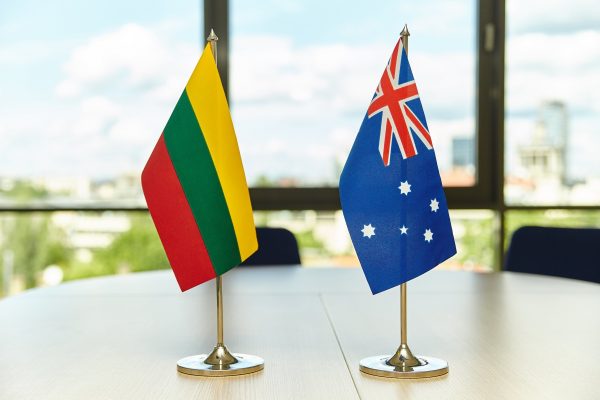
Lithuania’s foreign minister, Gabrielus Landsbergis, flew to Australia this week for the opening of his country’s new embassy in Canberra. The trip should have been a routine visit to cut a ribbon, shake hands with Australian politicians, diplomats, and business leaders, and meet with Lithuanian diaspora community groups. Yet in recent weeks the trip has taken on a much larger significance, as Australia has taken a keen interest in an ongoing dispute that Lithuania has with China.
Last year, Beijing became incensed that Lithuania allowed Taiwan to open a representative office in Vilnius using the name “Taiwan” (rather than the convention of using “Taipei” instead). In response to this affront, China has downgraded its diplomatic relationship with Lithuania, forcing Vilnius to repatriate its diplomats from China, and implemented an effective trade embargo against Lithuanian goods.
Yet as China accounts for only around 1 percent of Lithuania’s exports, Beijing felt the need to find an extra lever to punish the country. It did so by targeting a number of European companies that use Lithuanian labor and expanding the punishment to other European countries for being associated with Lithuania. Beijing’s belief seemed to be that this would lead to the European Union (EU) placing pressure on Lithuania to make a groveling apology to China, and to force Taiwan to rename its representative office using terms acceptable to Beijing.
Yet this isn’t what has happened. Instead the EU launched a case against China at the World Trade Organization (WTO). The EU claims that China’s behavior is illegal under WTO rules. The complaints against China include unfair trade and investment practices, refusal to clear Lithuanian goods through Chinese customs, rejecting Lithuanian import applications, and interfering with the EU’s single market and supply chains by targeting goods that contain Lithuanian content.
Although Australia is clearly not a party to the dispute, it has nonetheless requested to be included in the WTO’s consultation process. Australia is arguing that since it has also been a target of China’s attempts at economic coercion, it has a substantial interest in the consultation process. Furthermore, Australia believes that this is a global trend that requires firm rules to be established by the WTO to make it clear to China that its use of these tactics is unacceptable.
Yet beyond the intricacies of WTO rules, Australia’s approach is one that sees collective resistance to China’s behavior as the most viable path to making sure that Beijing fails in its objectives. If China can intimidate Lithuania – or indeed the EU – then economic coercion will become a normalized tool of international diplomacy, one that other countries may seek to emulate.
In an interview with the Australian Financial Review prior to his arrival in Australia, Landsbergis expressed a similar belief, stating that “what we’re seeing is that the world that was built after the Second World War, which was based on internationally agreed rules and regulations, is being challenged by the countries who want to change the rules-based world order into a power-based world order.”
Given that both Australia and Lithuania have been fiercely targeted by China’s attempts at economic coercion, Landsbergis added in expectation of meeting senior members of the Australian cabinet that “It will be very good to exchange notes about how we dealt with the situation, what did we learn, how to come out of it stronger, how can we help each other… Even though geographically we’re far away, the experiences are quite comparable. I think there’s a lot of camaraderie, a common spirit.”
The hope of expanding this common spirit has been given a boost with the United States, United Kingdom, and Taiwan also seeking to join the consultation process at the WTO for the EU’s case against China. This demonstrates that there are a number of countries that view China’s behavior with deep suspicion and are looking to make a point of their opposition.
But what this episode also reveals is that China’s belligerence consistently keeps backfiring. Prior to its dispute with Lithuania, Australia and Lithuania were two countries that had very little to do with each other. Lithuania is Australia’s 75th largest trading partner, with two-way trade valued at a little over $100 million. While Landsbergis will be upgrading the Lithuanian consulate in Canberra to an embassy, Australia doesn’t even have an embassy in Lithuania. The Australian Embassy in Poland handles its limited interests in Lithuania.
Now Landsbergis will engage in high level talks with Australia’s foreign and defense ministers; he will be given the opportunity to address the prestigious National Press Club (broadcast live on the Australian Broadcasting Corporation) and will be generally fêted around Canberra like a hero. The bonds between Australia and Lithuania will strengthen and China’s attempts to isolate the country will have achieved the very opposite.
How China’s Economic Coercion Is Bringing Lithuania and Australia Together
Source: Frappler

0 Comments